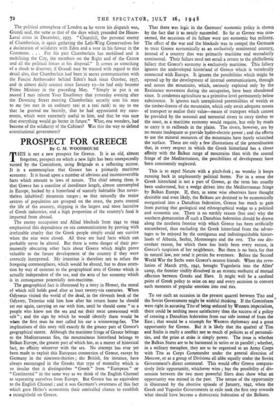PROSPECT FOR GREECE
By C. M. WOODHOUSE
THIS is not a new prospect for Greece. It is an old, almost forgotten, prospect on which a new light has been unexpectedly turned by the Cominform, using Belgrade as a reflecting mirror. It is a commonplace that Greece has a primarily maritime economy. It is based upon a number of obvious and incontrovertible facts which amount to laws of nature. The chief among them is that Greece has a coastline of inordinate length, almost unexampled in Europe, backed by a hinterland of scarcely habitable (but never- theless inhabited) mountain ranges ; so that naturally the major centres of population are grouped on the coast, the ports control the life of the country, shipping is the largest and most lucrative of Greek industries, and a high proportion of the country's food is imported from abroad.
The enemy occupation and Allied blockade from 1941 to 1944 emphasised this dependence on sea communications by proving with irrefutable cruelty that the Greek people simply could not survive when the seas were closed. All these are hard facts which can probably never be altered. But there is some danger of their per- manently obscuring other facts about Greece which might prove valuable to the future development of the country if they were correctly interpreted. My intention is therefore not to refute the foregoing commonplaces, which would be absurd, but to draw atten- tion by way of contrast to the geographical area of Greece which is actually independent of the sea, and the area of her economy which is in consequence potentially non-maritime.
The geographical fact is illustrated by a story in Homer, the moral of which still holds good after at least twenty-six centuries. When Odysseus visited the world of the dead, in the eleventh book of the Odyssey, Teiresias told him how after his return home he should set out again, carrying an oar with him, until he should come "to a people who know not the sea and eat their meat unseasoned with salt " ; and the sign by which he would identify them would be whim the first man he met called his oar a winnowing-fan. The implications of this story still exactly fit the greater part of Greece's geographical extent. Although the maritime fringe of Greece belongs to the Mediterranean Sea, the mountainous hinterland belongs to Balkan Europe, the greater part of which has, as a matter of historical fact, no affinity whatever with the sea. No attempt has ever yet been made to exploit this European connection of Greece, except by Germany in the nineteen-thirties ; the British, for instance, have always encouraged in the Greeks that type of mentality which is so insular that it distinguishes "Greek" from "European" or "Continental" in the same way as we think of the English Channel as separating ourselves from Europe. But Greece has no equivalent to the English Channel ; and it was Germany's awareness of this fact which gave Hitler's economists their unrivalled chance to establish a stranglehold on Greece.
That there was logic in the Germans' economic policy is shown by the fact that it so nearly succeeded. So far as Greece was con- cerned, the occasions of its failure were not economic but military. The effect of the wax and the blockade was to compel the Germans to treat Greece economically as an exclusively continental country, instead of a country that was primarily maritime and secondarily continental. Their failure need not entail a return to the phiffiellenie fallacy that Greece's economy is exclusively maritime. This fallacy ignores the undeveloped hinterland of Greece which is vertebrally connected with Europe. It ignores the possibilities which might be opened up by the development of internal communications, through and across the mountains, which, seriously explored only by the Resistance movement during the occupation, have been abandoned since. It condemns agriculture to a primitive level permanently below subsistence. It ignores such unexploited potentialities of wealth as the timber-forests of the mountains, which only await adequate means of transport to realise their value—means of transport which cannot be provided by the seasonal and torrential rivers to carry timber to the coast, as a maritime economy would require, but only by roads to carry it to railheads in the plains. The rivers, however, are by no means inadequate to provide hydro-electric power ; and the efforts to use the mineral resources of the mountains have barely scratched the surface. These are only a few illustrations of the generalisation that, in every respect in which the Greek hinterland has a closer affinity with the Balkan range of mountains than with the coastal fringe of the Mediterranean, the possibilities of development have been consistently neglected.
This is to expel Nature with a pitch-fork ; no wonder it keeps running back in unpleasantly political forms. For in a sense the Greek hinterland is not a part of Greece, as the term has usually been understood, but a wedge driven into the Mediterranean fringe by Balkan Europe. If, then, as some wise observers have thought desirable and even likely, the Balkans are destined to be economically reorganised into a Danubian federation, Greece has much to gain from putting that geological and ethnographical wedge to a political and economic use. There is no earthly reason (but one) why the southern demarcation Of such a Danubian federation should be drawn along the northern frontier with which Greece has been artificially encumbered, thus excluding the Greek hinterland from the advan- tages to be enjoyed by the contiguous and indistinguishable hinter- lands of Albania, Serbia, Montenegro and the rest. The one dis- cordant reason, for which there has lately been every excuse, is Greece's suspicion of her neighbours. But there is no basis for that in natural law, nor need it persist for evermore. Before the Second World War the Serbs were Greece's nearest friends. When the revo- lution of March 27th, 1941, brought Yugoslavia into the Allies' camp, the frontier visibly dissolved in an ecstatic outburst of mutual affection between Greeks and Slays. It might well be a cardinal point of Greek policy to seize on any and every occasion to convert such moments of popular emotion into real ties.
To see such an occasion in the present quarrel between Tito and the Soviet Government might be wishful thinking. If the Corninform were right in accusing Tito of being seduced by Western imperialism, there could be nothing more satisfactory than the success of a policy of creating a Danubian federation from our side instead of from the East ; that would be a triumph for Western diplomacy and a great opportunity for Greece. But it is likely that the quarrel of Tito and Stalin is really a conflict not so much of policies as of personali- ties, and the prize at stake is simply power. The issue is whether the Balkan States are to be harnessed in series or in parallel ; whether, in a military metaphor, they are to be organised as an Army Corps with Tito as Corps Commander under the general direction of Moscow, or as a group of Divisions all alike equally under the Soviet Government's direct command. This would offer Greece compara- tively little opportunity, whichever wins ; but the possibility of dis- sension between the two most powerful Slays does show what an opportunity was missed in the past. The nature of the opportunity is illustrated by the abortive episode of January, 1942, when the Greek and Yugoslav Governments in exile took the first step towards what should have become a democratic federation of the Balkans.
The Greco-Yugoslav Agreement of January, 1942, set up three " organs " of co-ordination between the two Governments: a Political Organ for foreign ,policy ; a Military Organ for common defence ; and, most significantly of all, an Economic and Financial Organ for the development of a customs and monetary union. This plan failed for reasons which had nothing to do with its merits ; it was crushed by a rival plan more ruthlessly executed by the U.S.S.R. But even the Soviet plan showed in the process of its execution that the ideas underlying this pact corresponded to economic realities. For the first test of Tito's power, and perhaps the first rift between him and the Soviet Government, came when he tried to seize Trieste in 1945. When the Yugoslav Government failed to win Trieste, and still more when it turned its attention to Salonika instead, it betrayed the essential weakness which it shared with the U.S.S.R., the lack of a first-class outlet to the sea. Neither can forget or overcome this need ; just as Russian foreign policy has always turned largely on Constantinople and the Dardanelles, so Yugoslav foreign policy between the wars turned decisively on the Free Zone permitted to Yugoslavia at Salonika. But if this issue could become, at least between Greece and Yugoslavia, one of co-operation instead of rivalry, the economic contribution of Greece to the Balkans is obvious. The propositions that the Balkans belong economically to Europe and that Greece's economy is primarily maritime are neither contradictory nor irrelevant to each other ; they are complementary.
The conclusion needs two qualifications. One is that there is no easy way to exploit the fact contained in it ; even a quarrel between the two great Slays opens up no highway to the goal, but only casts a distant light upon it. The other is that these are not the ratio- cinations of a professional economist ; they are only the reflections of a philhellene who has stood on Greece's northern frontiers and noticed that they do not exist. The natural retort to that, both literally and metaphorically, is that my stand is not taken on firm ground. I can believe it ; but I should like it proved, not taken for granted.



































 Previous page
Previous page